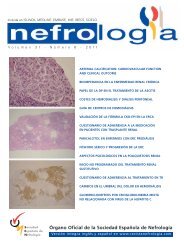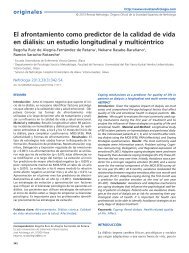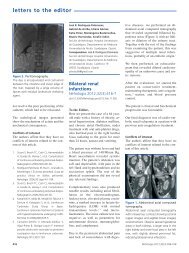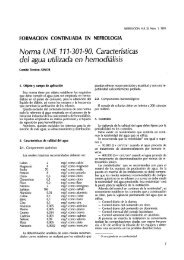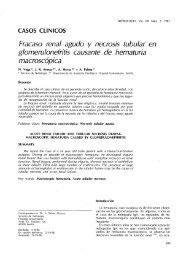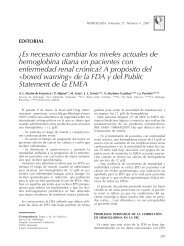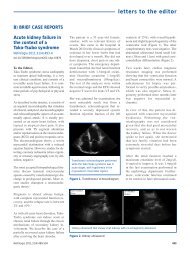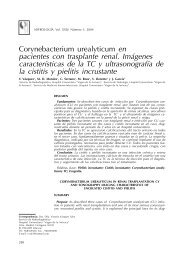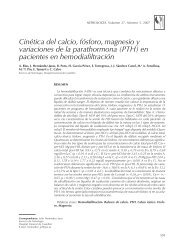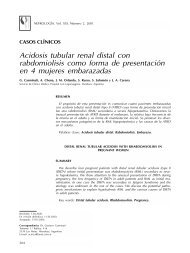PDF Número - NefrologÃa
PDF Número - NefrologÃa
PDF Número - NefrologÃa
You also want an ePaper? Increase the reach of your titles
YUMPU automatically turns print PDFs into web optimized ePapers that Google loves.
http://www.revistanefrologia.com<br />
© 2013 Revista Nefrología. Órgano Oficial de la Sociedad Española de Nefrología<br />
artículo especial<br />
Actualización en síndrome hemolítico urémico atípico:<br />
diagnóstico y tratamiento. Documento de consenso<br />
Josep M. Campistol 1 , Manuel Arias 2 , Gema Ariceta 3 , Miguel Blasco 1 , Mario Espinosa 4 ,<br />
Josep M. Grinyó 5 , Manuel Praga 6 , Roser Torra 7 , Ramón Vilalta 3 , Santiago Rodríguez de Córdoba 8<br />
1<br />
Servicio de Nefrología. Hospital Clínic. Barcelona<br />
2<br />
Servicio de Nefrología. Hospital Universitario Marqués de Valdecilla. Santander<br />
3<br />
Servicio de Nefrología Pediátrica. Hospital Universitari Materno-Infantil Vall d'Hebrón. Barcelona<br />
4<br />
Servicio de Nefrología. Hospital Universitario Reina Sofía. Córdoba<br />
5<br />
Servicio de Nefrología. Hospital Universitari de Bellvitge. Barcelona<br />
6<br />
Servicio de Nefrología. Hospital Universitario 12 de Octubre. Madrid<br />
7<br />
Enfermedades Renales Hereditarias. Fundació Puigvert. Barcelona<br />
8<br />
Departamento de Medicina Celular y Molecular. Centro de Investigaciones Biológicas (CSIC). Madrid<br />
Nefrologia 2013;33(1):27-45<br />
doi:10.3265/Nefrologia.pre2012.Nov.11781<br />
RESUMEN<br />
El síndrome hemolítico urémico (SHU) es una entidad clínica<br />
definida por la tríada anemia hemolítica no inmune, trombocitopenia<br />
e insuficiencia renal aguda, en la que las lesiones<br />
subyacentes están mediadas por un proceso de microangiopatía<br />
trombótica (MAT) sistémica. El SHU atípico (SHUa)<br />
es un subtipo de SHU en el que los fenómenos de MAT son<br />
consecuencia de la pérdida de regulación de la vía alternativa<br />
del complemento sobre las superficies celulares de causa<br />
genética. El SHUa es una enfermedad ultra-rara que, pese al<br />
tratamiento estándar con terapia plasmática, frecuentemente<br />
evoluciona a la insuficiencia renal crónica terminal, con<br />
elevada mortalidad. En los últimos años, se ha establecido el<br />
papel clave que desempeña el sistema del complemento en<br />
la inducción de daño endotelial en los pacientes con SHUa,<br />
mediante la caracterización de múltiples mutaciones y polimorfismos<br />
en los genes que codifican determinados factores<br />
del complemento. Eculizumab es un anticuerpo monoclonal<br />
que inhibe la fracción terminal del complemento bloqueando<br />
la formación del complejo de ataque de membrana. En<br />
estudios prospectivos en pacientes con SHUa su administración<br />
ha demostrado la interrupción rápida y sostenida del<br />
proceso de MAT, con mejorías significativas de la función renal<br />
a largo plazo y con una reducción importante de la necesidad<br />
de diálisis o terapia plasmática. En el presente documento<br />
se revisan y actualizan los diversos aspectos de interés<br />
de esta enfermedad, con especial atención a cómo los recientes<br />
avances diagnósticos y terapéuticos pueden modificar el<br />
tratamiento de los pacientes con SHUa.<br />
Palabras clave: Síndrome hemolítico urémico atípico.<br />
Eculizumab. Complemento. Microangiopatía trombótica.<br />
Correspondencia: Josep M. Campistol<br />
Servicio de Nefrología.<br />
Hospital Clínic.<br />
C/ Villarroel, 170. 08036 Barcelona.<br />
JMCAMPIS@clinic.ub.es<br />
An update for atypical haemolytic uraemic syndrome:<br />
diagnosis and treatment. A consensus document<br />
ABSTRACT<br />
Haemolytic uraemic syndrome (HUS) is a clinical entity<br />
defined as the triad of nonimmune haemolytic anaemia,<br />
thrombocytopenia, and acute renal failure, in which the<br />
underlying lesions are mediated by systemic thrombotic<br />
microangiopathy (TMA). Atypical HUS (aHUS) is a sub-type<br />
of HUS in which the TMA phenomena are the consequence<br />
of decreased regulation of the alternative complement<br />
pathway on cell surfaces due to a genetic cause. aHUS is an<br />
extremely rare disease that, despite the administration of<br />
standard treatment with plasma therapy, often progresses<br />
to terminal chronic renal failure with a high associated rate<br />
of mortality. In recent years, research has established the<br />
key role that the complement system plays in the induction<br />
of endothelial damage in patients with aHUS, through the<br />
characterisation of multiple mutations and polymorphisms<br />
in the genes that code for certain complement factors.<br />
Eculizumab is a monoclonal antibody that inhibits the<br />
terminal fraction of the complement protein, blocking the<br />
formation of a cell membrane attack complex. In<br />
prospective studies in patients with aHUS, administering<br />
eculizumab produces a rapid and sustained interruption in<br />
the TMA process, with significant improvements in longterm<br />
renal function and an important decrease in the need<br />
for dialysis or plasma therapy. In this document, we review<br />
and bring up to date the important aspects of this disease,<br />
with special emphasis on how recent advancements in<br />
diagnostic and therapeutic processes can modify the<br />
treatment of patients with aHUS.<br />
Keywords: Atypical hemolytic uremic syndrome.<br />
Eculizumab. Complement. Thrombotic microangiopathy.<br />
INTRODUCCIÓN<br />
El síndrome hemolítico urémico (SHU) es una entidad clínica<br />
que se define por la tríada anemia hemolítica microangio-<br />
27



